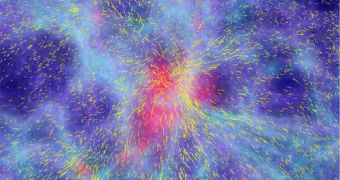According to a new series of scientific studies, it would appear that the Bing Bang, the moment that exploded the Universe into existence, was followed shortly after by a moment of pure chaos.
The term chaos is used here in its scientific sense. While one may expect that the Universe was not a very ordered place in the moments after the massive and rapid expansion scientists call the Big Bang, scientists have a very specific meaning in store for this word.
They define a system as chaotic if small events happening inside have the ability to create large-scale changes that affect the entire system. The simplest example of this is the butterfly effect.
In short, the butterfly effect states that, if a butterfly flaps its wings on on side of the planet, it may cause a hurricane on the other side, through a complex chain of causalities.
Previous investigations have hinted at the fact that the earliest moments of the Universe were chaotic, but the new research provides what is in the scientific community referred to as an iron-clad argument for this idea.
“The general result of this paper is that, contrary to what some previous studies have suggested, different observers would still agree about the chaotic nature of the universe,” explains researcher Adilson Motter.
“Now we establish once and for all that it is chaotic,” adds the expert, who was the leader of the new study. She holds an appointment as a physicist at the Northwestern University, in Chicago.
“The problem is ultimately related to the fact that different relativistic observers tend to perceive time differently,” the expert goes on to say.
“It means, in particular, that different scientists studying the same problem would conclude different things,” she adds. But the new calculations offer no room for doubt.
They were developed by Motter in collaboration with researcher and colleague Katrin Gelfert, who is based at the Federal University of Rio de Janeiro, in Brazil, Space reports.
“The main result is the possibility of a universal definition of chaos, i.e., a definition that doesn't depend of the observer,” argues physicist Alberto Saa, who was not involved in the work.
This is a longstanding problem,” adds the scientist, who is based at the State University of Campinas, in Brazil.
The research team determined that the pure chaos started happening about 10 to the minus 43 seconds after the rapid inflation, and that it lasted for only about 10 to the minus 36 seconds.
Details of the new investigation were published in a recent issue of the esteemed scientific journal Communications in Mathematical Physics.

 14 DAY TRIAL //
14 DAY TRIAL //